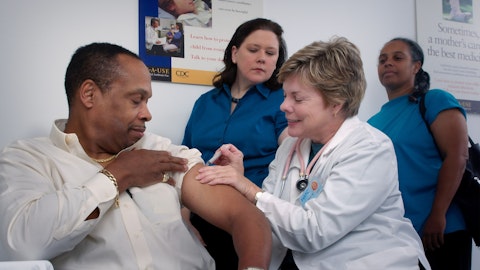Mani Foroohar: Okay. And pivoting over and a quick follow-up to strategic and sort of clinical development question. When you think about the user technology in oncology whether one wants to call it a personalized cancer vaccine neoantigen therapy whatever various competitors are calling their products now. How do you think about indication selection and to what extent is that informed by positioning indications and data from your competitors Moderna, Biotic, et cetera?
Myriam Mendila: Maybe I can take that. Sorry, Alex. If you’re okay, yeah, I can take it. I think it’s a great question. And yes, we’re doing all of that, right? Especially, for oncology, where you could go into 50-plus tumors and if you — divide them into molecular subtypes it’s even more. We did a strategic evaluation over the last quarter of last year really looking at all of the different possibilities where to go and then applying different criteria, with different waiting on how to rank those and then came up with basically a list of priorities considering commercial opportunity, considering competitive landscape available data. And that basically was an underlying basis or became the underlying basis for our oncology strategy.
So we are going strategically into specific indications, where we see the scientific need or the scientific rationale, the medical need the commercial opportunity, maybe also an edge versus the competitors and that sort of like is driving how we decide into which indications we’re going. Does that address your question?
Mani Foroohar: Yes, broadly. I guess a more, sort of, narrow question would be where should we be looking for data sets from you guys perhaps melanoma, perhaps elsewhere that we could look at to provide a little bit of a comparison on efficacy versus your competitors so that your stock is started getting some value for it — sort of evaluate your opportunity to differentiate.
Myriam Mendila: Yes. As said right we haven’t published clinical data, right? And if that’s your question. So that’s why right now those data are not available from — basically from our cancer vaccine in the clinic, maybe I misunderstand your question but.
Mani Foroohar: Yes, I’m thinking about what the timing — how we should think about the timing when we could see a data set that we could sort of an indication where we can sort of compare it with an existing competitor.
Myriam Mendila: That’s difficult to answer question because our current trial is ongoing in glioblastoma and to my knowledge there is no other mRNA vaccine ongoing in this space, right? So if you’re specifically asking to compare our platform with other platforms. Our next Phase 1 trial is in planning, right? So it will take some time until data will become available where you could probably compare in – across indications. But the one thing we all have to be cautious when you’re comparing across trials, right? Because we’re doing that ourselves as well when we’re looking at the other data but we realize how difficult it is to compare data in more tumor indications based on different vaccine platforms, based on different assays, patient selection criteria and so on.
While we all want to have and do those comparisons we also have to be cautious that cross-trial comparisons, cost-platform comparisons will have the limitation. So while I understand the need you would like to do that there’s also a I want to say a limited value. So I think when we publish the GBM data we have to take them as they are. Is this a validation of the platform? Will it show a great immunogenicity? And we will compare across other vaccine technologies, but those comparisons again have all their caviars and pitfalls.
Alexander Zehnder: Maybe just to add — I think maybe just to add to that I do believe here the MD Anderson collaboration will be able to help us a lot because at the end we have a differentiated product. It’s all about having the right antigens, good backbone, good delivery, good translational capabilities. And I think this collaboration that we announced a few weeks back with MD Anderson will really help us there and create an engine for us to produce hopefully differentiated products that make a difference for patients, right? So I think this is something that is going to increase our capabilities a lot. It will still take some time as we alluded until we see the declaring. But at least we have a great engine with this collaboration that should help us a lot to be faster and be more efficient as well and bring differentiated products to the market.
Operator: Thank you. Our next question comes from the line of Umer Raffat with Evercore ISI. Please proceed with your question.
Umer Raffat: Hi, guys. Thanks for taking my question. I have three here if I may. First, I know you talked about your wind down of the Pandemic Agreement with the German government. How does that change your anticipated time lines to market with your COVID vaccine? I would have thought Germany would have allowed you a more rapid path to market. Secondly, for your largest and most advanced trial of everything you’re running which is a COVID vaccine, I noticed the slides keep mentioning 601 and 701 formulations, but not the 801, which is a monovalent strain that you do have also as part of this trial. Could you give us more color on the anticipated timeline the readout of that and the specific strain that 801 covers? And then finally on Acuitas related delay on your litigation; wasn’t Acuitas only hoping to be a co-owner on your formulation patents meaning your CG and your Poly-A fames would have been unaffected anyways.
And I’m just trying to think about why all those plans were also looped up as part of the broader stay order? Thank you very much.
Alexander Zehnder: Thanks a lot Umer. So three questions. One on the PPA and timelines COVID-19 strain and then Marcus I will let you comment on Acuitas and the recent updates here. So Umer on the PPA, PPA should not impact the timelines at all, because following the pandemic emergency procedures that were in place to accelerate some of the approvals they are largely gone. So there’s no impact at all related to PPA or discontinuing PPA in terms of timelines in Germany. Myriam, do you want to comment on your most questions on strains COVID?





